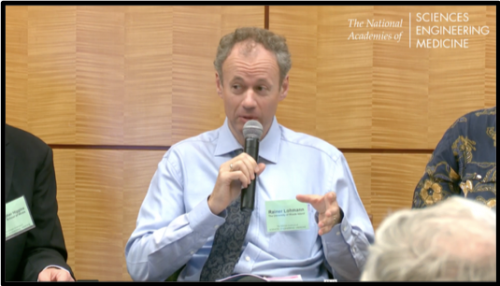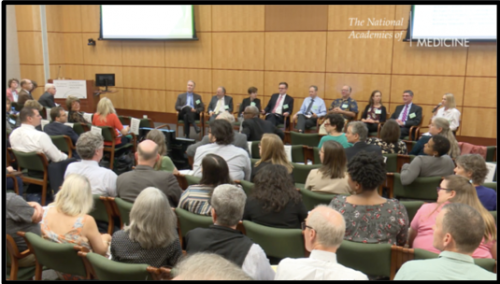
In September 2019, the National Academies Environmental Health Matters Initiative held its first workshop focused entirely on PFAS: “Identifying Opportunities to Understand, Control, and Prevent Exposure to PFAS” in Washington, D.C. The STEEP team was well represented: Dr. Elsie Sunderland (Project 1 Lead) co-organized the workshop, and both Dr. Laurel Schaider (CEC co-lead) and Dr. Rainer Lohmann (STEEP Director) were panelists during the discussion.
The workshop included three sessions – “Understanding PFAS Exposure,” “Treating PFAS Contaminated Media,” and “Controlling and Preventing PFAS Exposure” – each with an introductory talk followed by a panel discussion. There was general agreement among attendees that PFAS are present in essentially every person in the US, and that infants are among the most vulnerable humans given their high levels of exposure during critical time windows of development. Understanding all facets of human exposure to PFAS is complex, and involves uptake from drinking water, foods and food contact materials, indoor dust and inhalation. Numerous methods are being tested to remove PFAS from contaminated water followed by novel approaches to destroying them.

There was less agreement among attendees on how to prevent further regrettable substitutions of PFAS. (A regrettable substitution replaces one harmful chemical with a different, yet equally harmful chemical.) Another approach to PFAS could be to limit their use to “essential uses” in society – those necessary for health or safety, and one for which there are currently no available technically and economically feasible alternatives. However, industry representatives at the workshop were not enthusiastic about this idea. Given the high concern PFAS have raised for the safety of drinking water across the US, and the economic costs of keeping PFAS concentrations low, it seems most appropriate to limit the production of persistent chemicals such as PFAS to as little as possible.

